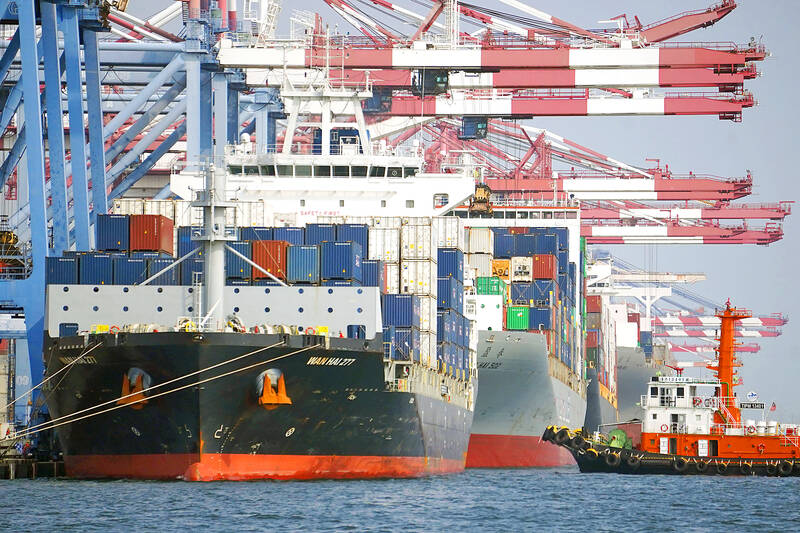The government’s business climate monitor last month flashed a 10th consecutive “blue” signal indicating a recessionary state after all economic indicators remained sluggish, although a decline in exports mitigated the situation, the National Development Council (NDC) said yesterday.
The total value of the nine monitoring components stayed unchanged at 15, making the contraction longer than that during the global financial crisis in 2008, and on par with the downturn during Europe’s debt problems in 2011 and the technology correction cycle in 2015, the council said.
“The score dropped to 10 in February and had since moved slowly upward, suggesting the worst is over,” deputy director of the council’s economic department Chiu Chiu-ying (邱秋瑩) told a news conference.

Photo: CNA
The latest improvement came after the retreat in exports eased, but the data on monetary supply measures worsened, the council said.
Foreign portfolio managers usually take shelter in the US dollar in bad times, while people put money away in time deposits to avoid risk.
Strong artificial intelligence (AI) demand allowed outbound shipments of information and communications technology products to register a rapid pickup last month and the release of new-generation mobile gadgets this month would lead to further growth momentum in the run-up to the Christmas season, Chiu said.
The council uses a five-color system to portray the nation’s economic health, with “green” signifying steady growth, “red” suggesting a boom and “blue” reflecting a recession. Dual colors suggest transition to a stronger or weaker state.
The retreat in industrial output also narrowed for similar reasons, Chiu said.
Domestically, the job market was stable, while retail and dining revenues continued to grow, she said.
However, securities accounts took a downturn as AI shares went through price corrections and weighed on demand for cash and cash equivalents, the council said.
The index of leading indicator series, which aims to foretell the economic scene six months ahead, shrank 0.3 percent to 99.06, it said.
The movement came after business confidence, stock prices and construction floor space gave positive cyclical readings, but labor accession rates and imports of semiconductor equipment deteriorated, the council said.
By contrast, the index of coincident indicators, which reflects the current economic situation, picked up 0.91 percent to 97.48, helped by better data on exports, non-farm payrolls, industrial production and electricity usage, it said.

Nvidia Corp CEO Jensen Huang (黃仁勳) is expected to miss the inauguration of US president-elect Donald Trump on Monday, bucking a trend among high-profile US technology leaders. Huang is visiting East Asia this week, as he typically does around the time of the Lunar New Year, a person familiar with the situation said. He has never previously attended a US presidential inauguration, said the person, who asked not to be identified, because the plans have not been announced. That makes Nvidia an exception among the most valuable technology companies, most of which are sending cofounders or CEOs to the event. That includes

TARIFF TRADE-OFF: Machinery exports to China dropped after Beijing ended its tariff reductions in June, while potential new tariffs fueled ‘front-loaded’ orders to the US The nation’s machinery exports to the US amounted to US$7.19 billion last year, surpassing the US$6.86 billion to China to become the largest export destination for the local machinery industry, the Taiwan Association of Machinery Industry (TAMI, 台灣機械公會) said in a report on Jan. 10. It came as some manufacturers brought forward or “front-loaded” US-bound shipments as required by customers ahead of potential tariffs imposed by the new US administration, the association said. During his campaign, US president-elect Donald Trump threatened tariffs of as high as 60 percent on Chinese goods and 10 percent to 20 percent on imports from other countries.

Taiwanese manufacturers have a chance to play a key role in the humanoid robot supply chain, Tongtai Machine and Tool Co (東台精機) chairman Yen Jui-hsiung (嚴瑞雄) said yesterday. That is because Taiwanese companies are capable of making key parts needed for humanoid robots to move, such as harmonic drives and planetary gearboxes, Yen said. This ability to produce these key elements could help Taiwanese manufacturers “become part of the US supply chain,” he added. Yen made the remarks a day after Nvidia Corp cofounder and chief executive officer Jensen Huang (黃仁勳) said his company and Taiwan Semiconductor Manufacturing Co (TSMC, 台積電) are jointly

United Microelectronics Corp (UMC, 聯電) expects its addressable market to grow by a low single-digit percentage this year, lower than the overall foundry industry’s 15 percent expansion and the global semiconductor industry’s 10 percent growth, the contract chipmaker said yesterday after reporting the worst profit in four-and-a-half years in the fourth quarter of last year. Growth would be fueled by demand for artificial intelligence (AI) servers, a moderate recovery in consumer electronics and an increase in semiconductor content, UMC said. “UMC’s goal is to outgrow our addressable market while maintaining our structural profitability,” UMC copresident Jason Wang (王石) told an online earnings